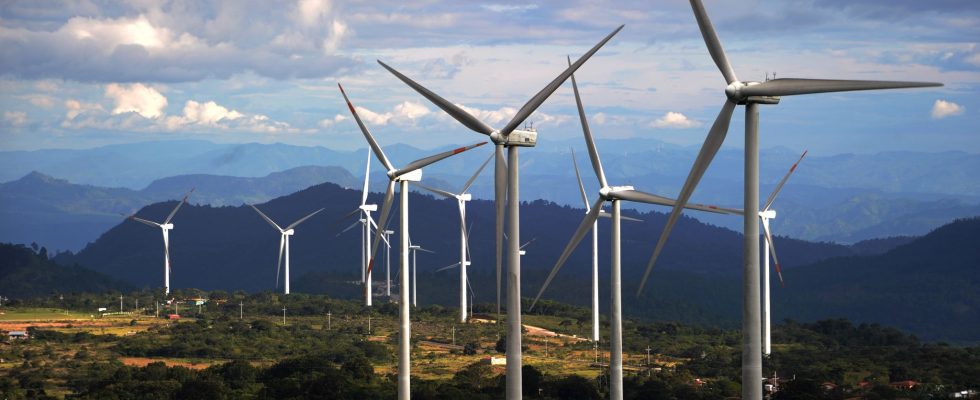The form may vary but the substance remains: renewable energies (RE) would take the place of nuclear. The assertion arises regularly, rehashed by fierce defenders of the atom. Latest outing: that of the former CEO of EDF Henri Proglio, whose remarks made during a seminar organized by the Res Publica foundation last March, have recently been reported by Marianne. According to him, “asking nuclear power to step aside when renewable energies – intermittent and non-programmable – arrive represents a gigantic additional cost. […] However, today, priority access [au réseau électrique] is given to renewables, and nuclear power must adapt. Another brilliant idea!” The urgency, in his eyes, would be to “define an optimum of nuclear production” to which to adhere. Impliedly: it would be necessary to determine a high limit to the share of renewable energies in the French electricity mix to take advantage of at maximum atomic yields.
“It’s a very bad way to defend nuclear, judge Nicolas Goldberg, senior energy and environment manager at Colombus Consulting. This debate is inaudible, because polluted by a lot of political positions and far from the technique.” Opinion shared by Géry Lecerf, president of the French Association independent of electricity and gas (Afieg), who affirms: “To accuse the ENR of being guilty of the modulation of the nuclear fleet, it is a sophism, a false trial arising from an anti-renewable discourse.”
Above all, the two experts point out, the modulation of the nuclear fleet is nothing new since it has always existed – or almost. Nicolas Goldberg also evokes “advanced know-how” mastered by the French energy company. “A real force”, confirmed last January Cédric Lewandowski, executive director of EDF in charge of the nuclear and thermal park, during his hearing before the commission of inquiry aimed at establishing the reasons for the loss of sovereignty and energy independence of France. “The French nuclear fleet has modulation capacities which most of the other fleets in the world do not benefit from”, he added. This skill must also be strengthened, assures the French Nuclear Energy Company (Sfen)because “the flexibility of nuclear power is decisive for a successful transition to a carbon-free economy and the successful integration of intermittent renewable energies into the electricity grid”.
A ceiling for renewables? “A madness”
With its recent law on the acceleration of the production of renewable energies, the government has confirmed the growing share that the latter will take in the French energy mix – while the country is lagging behind on its objectives in this area. “Given the need and the market prices for electricity, I am not sure that our problem is to have renewable energies”, points out Nicolas Goldberg, of Colombus Consulting. Especially since they have, until now, led to very little reduction in nuclear production. “The phenomenon […] remains rare and occurs mainly during periods of low electricity consumption”, specified RTE, the electricity transmission network, in a 2020 note. “Before, renewables counted too little in the mix to ‘displace’ nuclear power and now the latter is too weak”, agrees Cédric Philibert, independent consultant on energy issues and associate researcher at the French Institute of International Relations ( Ifri), defeating Henri Proglio’s argument.
The former CEO of Veolia and then of EDF deplores the price of such a strategy. With massive fixed costs and low variable costs, maximum profitability of nuclear implies, in principle, constant operation at a given power. However, if EDF proceeds with these modulations, “it is because it sees an interest in it”, notes Nicolas Goldberg, who cites in particular gains on fuel. Concerning their consequences on the industrial tool – accelerated fatigue and wear are often advanced -, they appear for the time being “quite minor”. “We did not find any traces of accelerated aging of the park”, noted Cédric Lewandowski, of EDF, before the commission of inquiry. But, because of global warming and the rise in power of renewable energies, which will have to provide a third of energy consumption by 2030, more in-depth work has been launched to find out whether more modularity, coupled with the shutdown of certain reactors, could “cause accelerated obsolescence”.
Nothing, for the time being, therefore encourages setting a ceiling not to be exceeded for renewable energies. “It would be madness, launches the consultant Cédric Philibert. It is rather up to the nuclear industry to provide proof that it can still build a power plant within the time limits and at the planned costs. According to the researcher associated with Ifri, the problem should rather be reversed: “What is the ideal level of nuclear power in an interconnected Europe with a lot of renewables?” All the interlocutors interviewed agree that the future of energy – and electricity – will go through increased flexibility of production sources. “Is it nuclear to ensure it or should we turn to other options? And which ones?” asks Géry Lecerf, from Afieg. This is the real debate.
